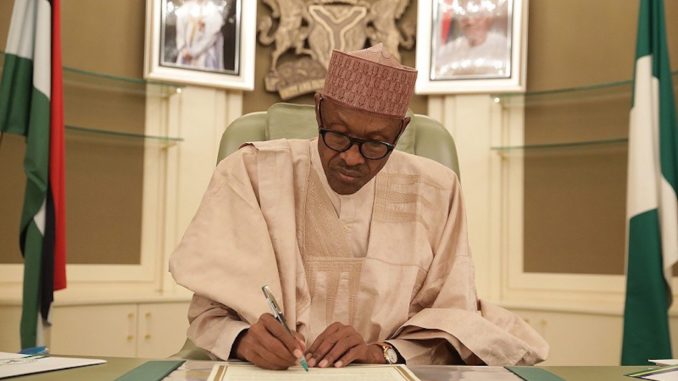
ALL hopes of inculcating credibility into the electoral system now hang delicately in the balance. Controversially, President Muhammadu Buhari has refused to assent to the Electoral Act 2018 amendment bill, which was passed by the National Assembly and forwarded to him last November. His obduracy, which has triggered a political storm, gives the impression of delaying tactics, and pushes the 2019 general election into uncertain territory.
Buhari’s veto is bizarre, going by his avowal to eliminate fraud in our elections. As a legal framework, the rejected amendments contain landmark provisions that will fortify the electoral system against the formidable rigging machinery of the political actors. Two of these amendments stand out. One provides a legal backing for the use of the Smart Card Reader; a second outlaws the use of Incident Forms. However, Buhari cited the lame excuse that they would cause confusion for the Independent National Electoral Commission because the polls were too close for their implementation.
The card reader, which was first deployed in the 2015 elections, is the technology for authenticating and accrediting voters who have acquired their permanent voter cards. It reduced the outrageous figures that were usually recorded in previous elections. But the Supreme Court, in its wisdom, put its use in doubt. It strangely ruled that the Electoral Act 2010 did not provide a legal backing for INEC to deploy it; thus, it refused to cancel some elections that witnessed these inflated figures – more than the number of registered PVCs.
Nevertheless, Buhari threw the bill away. His action has thrown the card reader implementation into a fresh debacle. Mischievous politicians might latch onto the discord between the President and the National Assembly to undermine the outcome of the 2019 elections. In a world increasingly defined by the use of digital technology in providing solutions, the President ought to have looked at the bigger picture and signed the bill.
The IF is closely related to the card reader. That form is the manual back-up in case the card reader fails on Election Day. INEC says that the ad hoc staff members deliberately tamper with the equipment so that they could use the IF, through which they record bloated figures for their paymasters. Seeing that it is a major weakness in the electoral process, INEC had concluded that the form would not be in use in 2019. Why then would the President dismiss this noble idea?
Among other things, the bill provides for the electronic transmission of results from the polling units (to compare with the manual record), the serialisation of ballot papers for each polling unit and the announcements of results in the presence of all party agents. The political system is ripe for these laudable measures.
Buhari’s annoying rigmarole began in March when the National Assembly first passed the amendments. After a tortuous hiatus, the President returned the bill to the parliament unsigned. His beef: the National Assembly usurped the statutory powers of INEC by reordering the sequence of elections. When the matter went to court, the Court of Appeal ruled that the National Assembly could change the sequence. After a lot of hot air, the lawmakers nevertheless expunged the provision and sent it back to the President.
By this time, the expectation was that Buhari would sign it. But he did not. The President, this time, cited “typographical errors,” which the lawmakers again worked on. Yet, he did not assent to it, claiming that there were issues with “cross-referencing” in the bill. Again, the legislators reviewed it and produced another document. It is a shame that Buhari threw it away unsigned. The President’s argument this time is laughable.
However, despite Buhari’s unilateral action, we urge INEC to do all in its power to use the card reader and disallow the IFs in 2019. As reference, this year’s governorship polls in Ekiti and Osun states were conducted with the Enhanced Card Reader. It worked faster, aided accreditation and voting, and reduced the incidence of manufacturing outlandish figures. At that time, the anticipation was that the card reader would be used in the 2019 general election to entrench transparency in our perverted elections. Therefore, INEC must not settle for less.
While Buhari is waffling, in 2014, Namibia made the jump to electronic voting. “The decision to consider acquiring electronic voting machines was primarily based on some challenges and experiences that we have had in the manner and way we manage our elections,” Namibia electoral commission’s chief, Theo Mujoro, said. In March 2018, Sierra Leone partially tested the block chain-powered technology for its presidential polls with a view to its full integration into future elections.
Nigeria, which deployed the PVC and the SCR in 2015, should therefore not return to the analogue and cumbersome paper/manual age chiefly responsible for its discredited electoral system. In the national interest, and to mend the broken relationship between the executive and the legislature, Buhari, especially, and the National Assembly, should eat the humble pie. The areas of disagreement should be jointly corrected swiftly.
Running transparent, free and fair elections in the 21st Century is a complicated task that requires a generation jump in the deployment of technology. As a newspaper, we reiterate that only card readers should be used to conduct the 2019 polls.
END

Be the first to comment